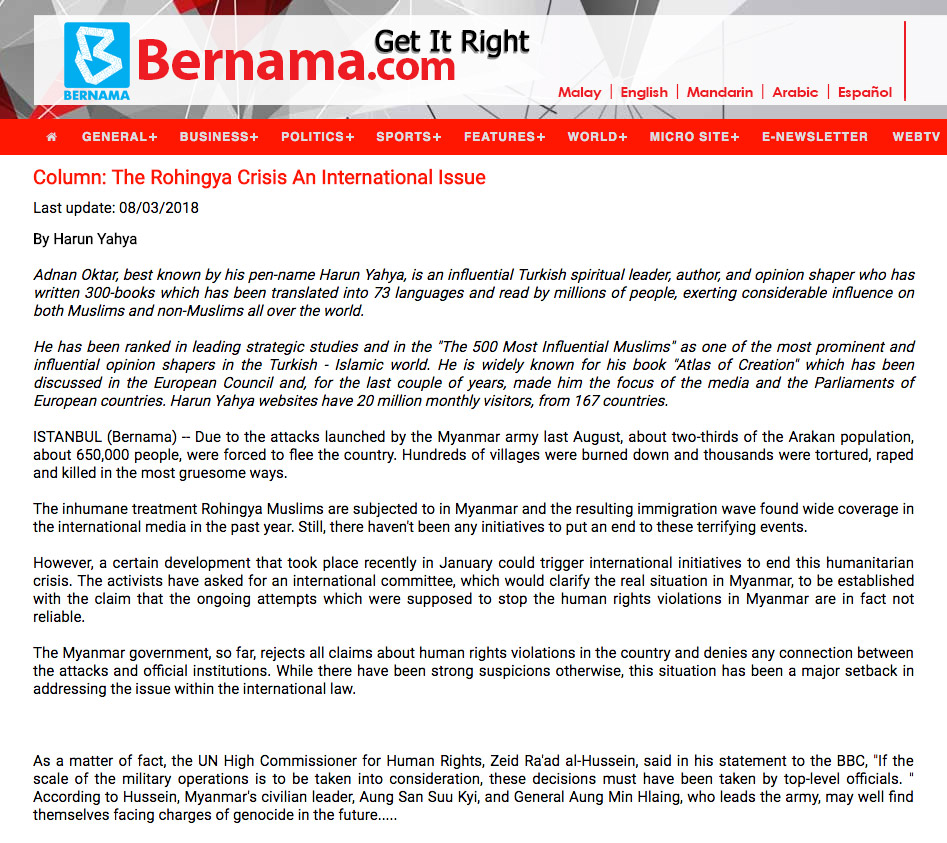
Due to the attacks launched by the Myanmar army in the last August, about two-thirds of the Arakan population, about 650,000 people, were forced to flee the country. Hundreds of villages were burned down and thousands were tortured, raped and killed in the most gruesome ways.
The inhumane treatment Rohingya Muslims are subjected to in Myanmar and the resulting immigration wave found wide coverage in the international media in the past year. Still, there haven’t been any initiatives to put an end to these terrifying events. However, a certain development that took place recently in January could trigger international initiatives to end this humanitarian crisis. The activists have asked for an international committee, which would clarify the real situation in Myanmar, to be established with the claim that the ongoing attempts which were supposed to stop the human rights violations in Myanmar are in fact not reliable.
The Myanmar government, so far, rejects all claims about human rights violations in the country and denies any connection between the attacks and official institutions.[i] While there have been strong suspicions otherwise, this situation has been a major setback in addressing the issue within the international law.
As a matter of fact, the UN High Commissioner for Human Rights, Zeid Ra'ad al-Hussein, said in his statement to the BBC, "If the scale of the military operations is to be taken into consideration, these decisions must have been taken by top-level officials." According to Hussein, Myanmar's civilian leader, Aung San Suu Kyi, and General Aung Min Hlaing, who leads the army, may well find themselves facing charges of genocide in the future.[ii]
Following this statement, for the first time the Myanmar army admitted that ten Rohingya Muslims were killed by soldiers and Buddhist villagers. Human rights organizations have interpreted this confession as " the tip of the iceberg" and Amnesty International and Human Rights Watch have both called for an international inquiry.[iii]
This inquiry has shortly been followed by another; the delegation of the EU to Myanmar called for an independent inquiry team to be admitted into the country from the Myanmar government. The EU delegation stated, "These brutal killings confirm the urgent need for a thorough and credible investigation into all violent incidents in the region. Impunity of perpetrators of such serious human rights violations must end." In the end, the EU's call to the Myanmar government is “to cooperate fully with the Human Rights Council's independent international fact-finding mission and other independent observers including journalists and to provide for their full, safe and unhindered access to all conflict areas without delay.”[iv]
There are many international institutions and organizations that can expose how grave the situation is for Rohingya; one of them is Amnesty International. Amnesty officials claim that they have concrete evidence proving that Myanmar soldiers raped and killed Rohingyas, burned down their villages, and buried civilians in mass graves.[v]
The UNICEF spokesperson, Marixie Mercado, who spent a month in the country last December, says that children in Rakhine State are forced to live under terrible conditions in exile camps, where the International Convention on the Rights of the Child has been repeatedly violated. Many children are severely undernourished, and have no access to clean water and food. They have to walk barefoot in cesspits. In addition, treatment centers in the camps are deliberately looted and destroyed. Mercado calls on the global community and the regional organizations and countries to leverage their influence to remedy this grave situation, stating that delivering humanitarian aid to the region is becoming increasingly difficult.[vi]
So far, the Myanmar government has not responded positively to the international organizations’ requests to make official observations in Arakan. As a matter of fact, the Myanmar government has denied access to Yanghee Lee, the UN’s Special Myanmar Special Rapporteur on Human Rights, to the country. Moreover, the government also declared that Lee will receive no cooperation whatsoever during her mission. Lee noted that even this declaration of the Myanmar government is an indication of the terrible events taking place in the country, and announced that following her visits to Bangladesh on January 18-24, and to Thailand on January 25-30, she will submit her report to the UN Human Rights Council, which will be held in the UN Geneva Office in March.[vii]
It is quite difficult for the Myanmar government to continue resisting against the increased demands and pressure of international human rights institutions and non-governmental organizations, especially the UN. If an official group - along with journalists - is given an opportunity to make observations, more concrete evidence can be gathered about the crimes committed in Arakan and those who are responsible. The discovery of such evidence is crucial to the initiation of the legal process to investigate the crimes committed.
The UN's top human rights officials described Myanmar’s treatment of its Rohingya population as a “textbook example of ethnic cleansing.”[viii] This situation makes it vital to keep in mind two very important points that should not be overlooked:
The first is the fact that those leaders and administrators who’ve attempted ethnic cleansing throughout history have always used diabolically ingenious methods to conceal what they do. The other is that those who are responsible would prolong the process as long as they can, accelerating the pace at which the ethnic cleansing is carried out. For this reason, the international community must act faster and with greater organization in order to prevent more people from being killed or tortured.
0 comments:
Post a Comment